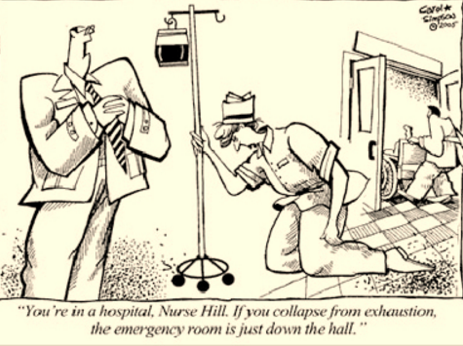In many instances, a human being who has the responsibility for the care of another could no longer keep up with the caregiver role because of physical limitation – one of the human factors that could often lead to adverse events in healthcare. Human factors is the study of the interrelationship between humans, the tools and equipment they use in the workplace, and the environment in which they work.1 In the clinical setting, when these factors are poorly matched with the tasks that nurses perform, the result is poor outcome in quality of care and the safety of patients. To put it clearly, the nurse shown in the picture may not be able to perform at her best due to stressful and hurried work environment or fatigue after 12 intense hours of work. The worse thing that could happen is that she may be perceived as incompetent and negligent.
Keep in mind that the qualities you bring to the job such as knowledge, skill level, experience, intelligence, sensory capabilities, training and education, and even organismic and attitudinal states such as alertness, fatigue, and motivation, are fundamental to your ability to perform your work2. The key is being able to recognize and apply human factors thinking to the work environment. The acronym IM SAFE (illness, medication, stress, alcohol, fatigue, emotion) that was developed in the aviation industry is useful as a self-assessment technique to determine when entering the workplace each day whether a person is safe for work.
What about you, are you safe for work? Here are some tips to avoid potential human errors:
- Avoid reliance on memory. Write it down or document as soon as possible. A verbal order needs to be written, read back, and verified.
- Make things visible. Place signs where they need to be. Isolation precautions signage should be placed where everyone could see it prior to entering the patient’s room.
- Get enough rest and sleep prior to your shift. Eat, hydrate, and don’t forget to take bathroom breaks.
Contact a Dallas Nurse Attorney If Approached by the Texas BON
If you are facing a disciplinary action case with the Texas BON, do not delay in calling or texting the Law Office of Yong J. An at 832-428-5679. We have helped countless nurses in Texas maintain their licenses and protect their right to earn a living. Find out how we can help to prepare your defense of your nursing license today.
References
- Kohn LT, Corrigan JM, Donaldson MS, eds. To err is human – building a safer health system. Washington, DC, Committee on Quality of Health Care in America, Institute of Medicine, National Academy Press, 1999.
Kerm Henricksen, Margeret Keyes, Pascale Carayon, and Ronda Hughes. “Understanding Adverse Events: A Human Factors Framework.” Patient Safety and Quality: An Evidence-Based Handbook for Nurses. Ed. Elizabeth Dayton. Rockville: AHRQ, 2008.

